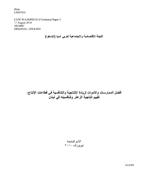The Arabic term zaatar designates a variety of aromatic perennial plants typically harvested from the wild, which generally belong to the Origanum, Thymus and other genera of the Lamiaceae (mint) family. The term zaatar is also used to designate the different herb mixes, which in addition to the zaatar herb, usually include such other traditional ingredients as grilled sesame seeds, sumac fruits (Rhus coriaria L.) and salt. Each country possesses its own zaatar mix recipe with specific proportions of ingredients. Zaatar , whether fresh or dried, is a common item in Mediterranean diets and is witnessing burgeoning consumer demand. As such, its cultivation presents interesting economic opportunities for farmers in selected ESCWA member countries. However, large-scale cultivation and processing of zaataris still very limited in the region. In South Lebanon, interventions by ESCWA and other development agencies demonstrated that zaatar cultivation can be pursued as an attractive alternative to subsidized tobacco monoculture and a profitable way to diversify agricultural development and alleviate pressure on wild natural resources.
رمز الوثيقة:
E/ESCWA/SDPD/2010/Technical Paper.3
تاريخ النشر:
2010






